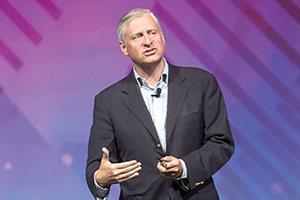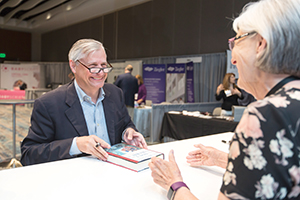By MARY ANN STEINER
SAN DIEGO — An esteemed historian and commentator on American political history, especially of American presidents, Jon Meacham made the case at the Catholic Health Assembly that the lessons of the past can serve as a diagnostic guide to what seems like a very fractured present.

Jon Meacham
Photo by Jerry Naunheim Jr./© CHA
Citing Thomas Jefferson, the Pulitzer Prize-winning author described the notion of a republic as "a public thing whose component parts are individuals." Jefferson and his fellow framers of the Constitution drafted that document with full knowledge of what those individuals could pursue — economies of greed as well as generosity, attitudes of open arms or closed hearts, and an American vision that could look forward in hope or backward in limitation.
In a keynote address June 11, Meacham stressed that the dynamic of an engaged citizenry always will span its best and worst impulses. Quoting Abraham Lincoln, whose first inaugural address in 1861 called for Americans divided against each other to find again "the better angels of our nature," Meacham set out what he believes to be the four characteristics each citizen should act on in pursuit of their own better angels.
Humility, he said, is the ability to admit a mistake and learn from it. Meacham offered as an example an act of humility that may have saved the world from nuclear war. President John F. Kennedy admitted that his disastrous handling of the 1961 Bay of Pigs invasion quickly put the U.S. at the center of a precarious international crisis. Fortunately, Kennedy had the humility to seek and follow the advice of his presidential predecessor, the seasoned general Dwight Eisenhower. Meacham implied that Eisenhower's counsel — to consider the viewpoints of all stakeholders before acting — informed Kennedy's ability to negotiate a peaceful end to the Cuban Missile Crisis.
Next Meacham cited the characteristic of curiosity, coupled with the confidence that the American dream "is big enough and strong enough to absorb the best of the rest of the world." Both Harry Truman and Lyndon Johnson took strong stands for civil rights because of their confidence in the American vision.
Meacham drew upon the famous speeches and private communications between British Prime Minister Winston Churchill and President Franklin Roosevelt to illustrate the third characteristic, candor. Reciting part of Churchill's famous Dunkirk speech of 1940, Meacham highlighted the candor within the eloquent call to sacrifice and heroism in pursuit of victory. After the retreat at Dunkirk, Churchill fortified the British public for the hard, painful campaign ahead. Churchill ended the speech with an admission that the British could fail and that if they did, they "would carry on the struggle, until, in God's good time, the New World, with all its power and might, steps forth to the rescue and the liberation of the old." In other words, they would hope to be liberated by U.S. forces and Churchill knew that Roosevelt would hear those words that way.

Historian Jon Meacham signs a copy of his book The Soul of America: The Battle for Our Better Angels following his speech at the Catholic Health Assembly.
Photo by Jerry Naunheim Jr./© CHA
For his part, Roosevelt used equally eloquent candor in a fireside chat later known as his "Arsenal of Democracy" speech. The president said, "If Great Britain goes down, the Axis powers will be in a position to bring enormous military and naval resources against this hemisphere." He was letting the American people know that the U.S. would prepare to provide military assistance to the British. Both are examples of leaders being truthful to their citizens, and truthful to themselves.
Meacham identified the fourth virtue of better angels as empathy — an ability to extend respect and compassion to those who have been humiliated, isolated or subjugated. While he alluded to America's assistance to post-World War II Germany, he focused on an instance of personal respect President George H.W. Bush accorded Mikhail Gorbachev, president of the Soviet Union, when both men were in office.
Meacham, who wrote a biography of Bush, said he took no small amount of grief for his decision not to attend ceremonies celebrating the reunification of Germany and the end of the Cold War after the fall of the Berlin Wall in 1989. In solidarity with Gorbachev, one of his fellow architects of the reunification of Germany, Bush chose to quietly support the Soviet president, who ultimately would be forced to resign as the Soviet Union broke up. "He knew if he showed up in Berlin, he would complicate the path that led to that Christmas day in 1991 when the Soviet Union peaceably passed into history," Meacham said.
"Is there a more moral path, is there a more empathetic act than the capacity to see the world through another's eyes?" Meacham asked. "I would suggest not, and I would say without that capacity to see the world through other eyes, the republic itself would teeter. It is not simply true at the highest level. It is true for all of us."
Copyright © 2018 by the Catholic Health Association
of the United States
For reprint permission, contact Betty Crosby or call (314) 253-3490.